Social Policy Debates and Aged People in the Australian Welfare State
VerifiedAdded on 2023/06/03
|7
|1859
|423
Essay
AI Summary
This essay delves into the intricate relationship between social policy debates, changes within the Australian welfare state, and their profound impact on the aged population. It commences by defining key concepts relevant to social policy and the elderly, setting the stage for an examination of how income support and other welfare domains affect this demographic. The essay meticulously outlines the various governmental and non-governmental programs designed to support the aged, including the Age Pension, financial assistance schemes, and healthcare benefits. It critically analyzes the strengths and limitations of these policies, drawing upon wider reading to support its arguments. The discussion extends to potential future issues, considering the growing elderly population and the associated financial burdens on the government. The essay concludes by proposing realistic, research-informed strategies to address these challenges, ensuring the continued well-being and human rights of the aged population within the evolving landscape of Australian social policy. The essay highlights the need for policy revisions that consider the unique needs of the elderly while maintaining a balance between individual responsibility and government support.
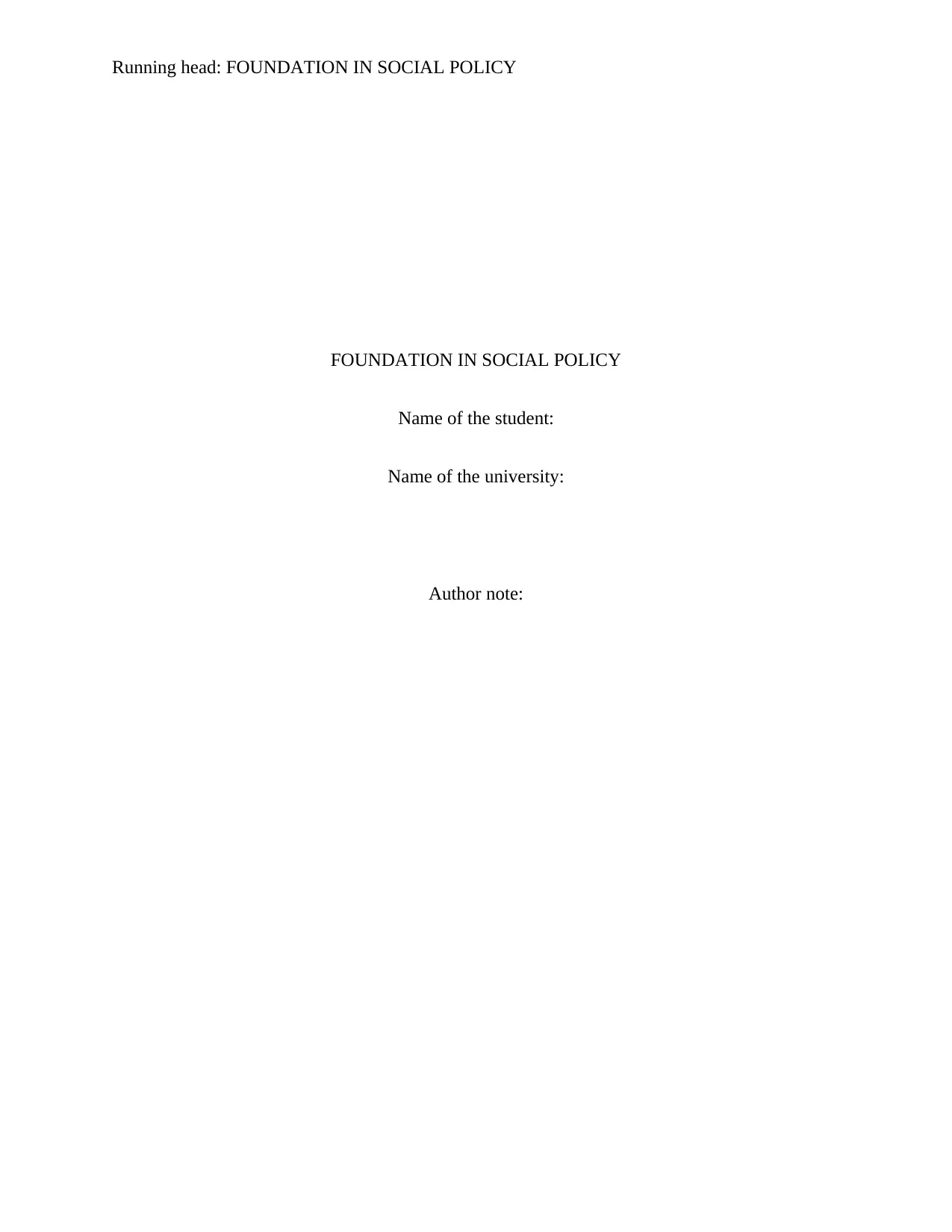
Running head: FOUNDATION IN SOCIAL POLICY
FOUNDATION IN SOCIAL POLICY
Name of the student:
Name of the university:
Author note:
FOUNDATION IN SOCIAL POLICY
Name of the student:
Name of the university:
Author note:
Paraphrase This Document
Need a fresh take? Get an instant paraphrase of this document with our AI Paraphraser
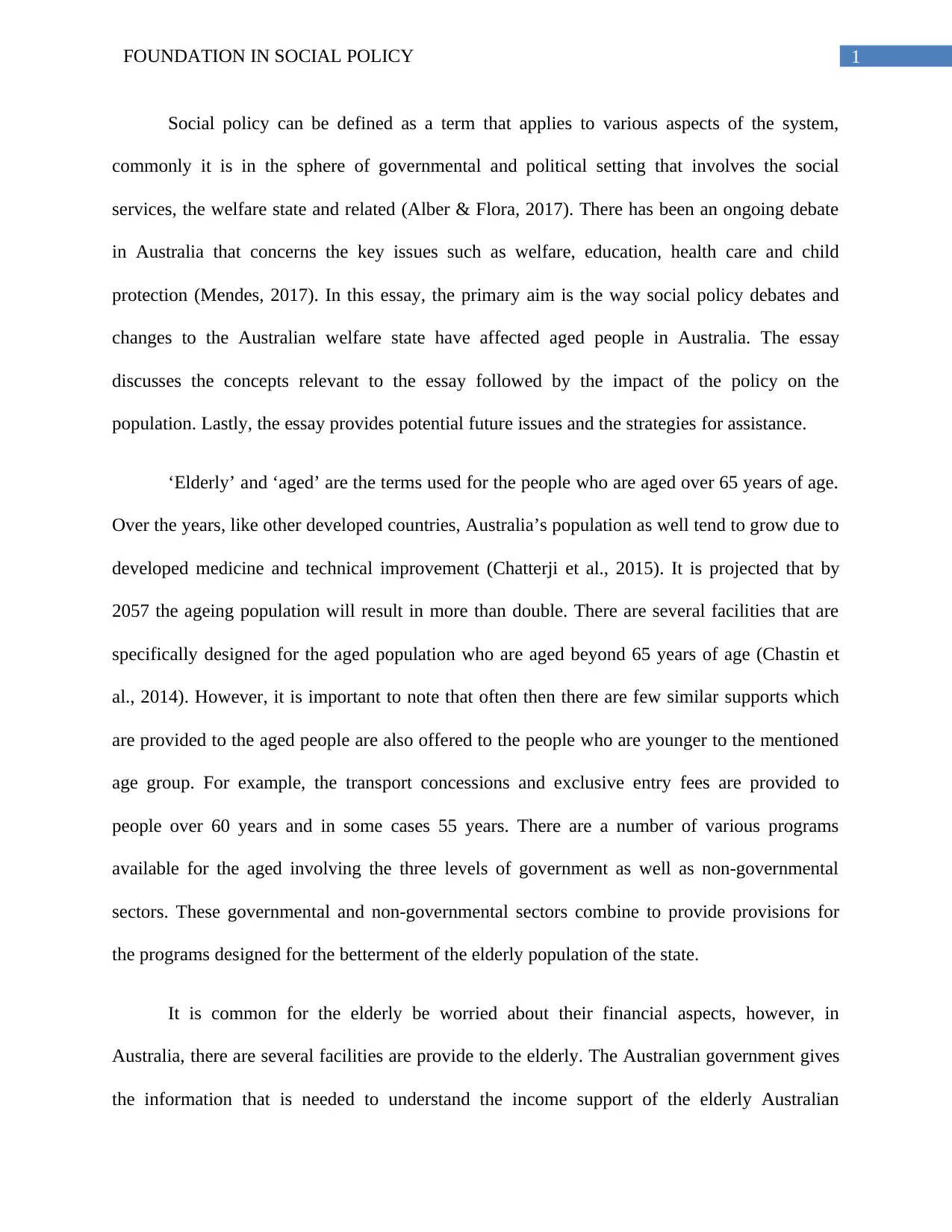
1FOUNDATION IN SOCIAL POLICY
Social policy can be defined as a term that applies to various aspects of the system,
commonly it is in the sphere of governmental and political setting that involves the social
services, the welfare state and related (Alber & Flora, 2017). There has been an ongoing debate
in Australia that concerns the key issues such as welfare, education, health care and child
protection (Mendes, 2017). In this essay, the primary aim is the way social policy debates and
changes to the Australian welfare state have affected aged people in Australia. The essay
discusses the concepts relevant to the essay followed by the impact of the policy on the
population. Lastly, the essay provides potential future issues and the strategies for assistance.
‘Elderly’ and ‘aged’ are the terms used for the people who are aged over 65 years of age.
Over the years, like other developed countries, Australia’s population as well tend to grow due to
developed medicine and technical improvement (Chatterji et al., 2015). It is projected that by
2057 the ageing population will result in more than double. There are several facilities that are
specifically designed for the aged population who are aged beyond 65 years of age (Chastin et
al., 2014). However, it is important to note that often then there are few similar supports which
are provided to the aged people are also offered to the people who are younger to the mentioned
age group. For example, the transport concessions and exclusive entry fees are provided to
people over 60 years and in some cases 55 years. There are a number of various programs
available for the aged involving the three levels of government as well as non-governmental
sectors. These governmental and non-governmental sectors combine to provide provisions for
the programs designed for the betterment of the elderly population of the state.
It is common for the elderly be worried about their financial aspects, however, in
Australia, there are several facilities are provide to the elderly. The Australian government gives
the information that is needed to understand the income support of the elderly Australian
Social policy can be defined as a term that applies to various aspects of the system,
commonly it is in the sphere of governmental and political setting that involves the social
services, the welfare state and related (Alber & Flora, 2017). There has been an ongoing debate
in Australia that concerns the key issues such as welfare, education, health care and child
protection (Mendes, 2017). In this essay, the primary aim is the way social policy debates and
changes to the Australian welfare state have affected aged people in Australia. The essay
discusses the concepts relevant to the essay followed by the impact of the policy on the
population. Lastly, the essay provides potential future issues and the strategies for assistance.
‘Elderly’ and ‘aged’ are the terms used for the people who are aged over 65 years of age.
Over the years, like other developed countries, Australia’s population as well tend to grow due to
developed medicine and technical improvement (Chatterji et al., 2015). It is projected that by
2057 the ageing population will result in more than double. There are several facilities that are
specifically designed for the aged population who are aged beyond 65 years of age (Chastin et
al., 2014). However, it is important to note that often then there are few similar supports which
are provided to the aged people are also offered to the people who are younger to the mentioned
age group. For example, the transport concessions and exclusive entry fees are provided to
people over 60 years and in some cases 55 years. There are a number of various programs
available for the aged involving the three levels of government as well as non-governmental
sectors. These governmental and non-governmental sectors combine to provide provisions for
the programs designed for the betterment of the elderly population of the state.
It is common for the elderly be worried about their financial aspects, however, in
Australia, there are several facilities are provide to the elderly. The Australian government gives
the information that is needed to understand the income support of the elderly Australian
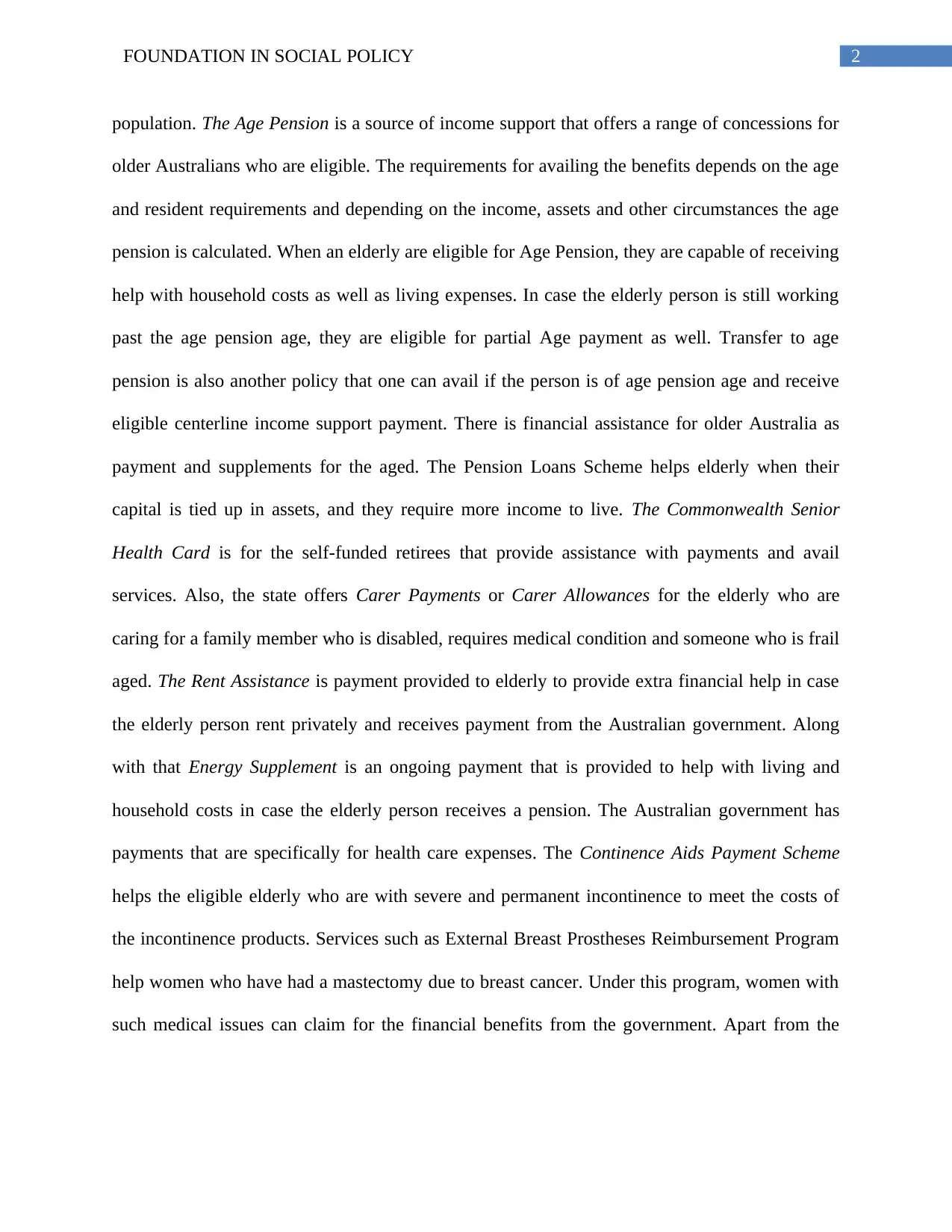
2FOUNDATION IN SOCIAL POLICY
population. The Age Pension is a source of income support that offers a range of concessions for
older Australians who are eligible. The requirements for availing the benefits depends on the age
and resident requirements and depending on the income, assets and other circumstances the age
pension is calculated. When an elderly are eligible for Age Pension, they are capable of receiving
help with household costs as well as living expenses. In case the elderly person is still working
past the age pension age, they are eligible for partial Age payment as well. Transfer to age
pension is also another policy that one can avail if the person is of age pension age and receive
eligible centerline income support payment. There is financial assistance for older Australia as
payment and supplements for the aged. The Pension Loans Scheme helps elderly when their
capital is tied up in assets, and they require more income to live. The Commonwealth Senior
Health Card is for the self-funded retirees that provide assistance with payments and avail
services. Also, the state offers Carer Payments or Carer Allowances for the elderly who are
caring for a family member who is disabled, requires medical condition and someone who is frail
aged. The Rent Assistance is payment provided to elderly to provide extra financial help in case
the elderly person rent privately and receives payment from the Australian government. Along
with that Energy Supplement is an ongoing payment that is provided to help with living and
household costs in case the elderly person receives a pension. The Australian government has
payments that are specifically for health care expenses. The Continence Aids Payment Scheme
helps the eligible elderly who are with severe and permanent incontinence to meet the costs of
the incontinence products. Services such as External Breast Prostheses Reimbursement Program
help women who have had a mastectomy due to breast cancer. Under this program, women with
such medical issues can claim for the financial benefits from the government. Apart from the
population. The Age Pension is a source of income support that offers a range of concessions for
older Australians who are eligible. The requirements for availing the benefits depends on the age
and resident requirements and depending on the income, assets and other circumstances the age
pension is calculated. When an elderly are eligible for Age Pension, they are capable of receiving
help with household costs as well as living expenses. In case the elderly person is still working
past the age pension age, they are eligible for partial Age payment as well. Transfer to age
pension is also another policy that one can avail if the person is of age pension age and receive
eligible centerline income support payment. There is financial assistance for older Australia as
payment and supplements for the aged. The Pension Loans Scheme helps elderly when their
capital is tied up in assets, and they require more income to live. The Commonwealth Senior
Health Card is for the self-funded retirees that provide assistance with payments and avail
services. Also, the state offers Carer Payments or Carer Allowances for the elderly who are
caring for a family member who is disabled, requires medical condition and someone who is frail
aged. The Rent Assistance is payment provided to elderly to provide extra financial help in case
the elderly person rent privately and receives payment from the Australian government. Along
with that Energy Supplement is an ongoing payment that is provided to help with living and
household costs in case the elderly person receives a pension. The Australian government has
payments that are specifically for health care expenses. The Continence Aids Payment Scheme
helps the eligible elderly who are with severe and permanent incontinence to meet the costs of
the incontinence products. Services such as External Breast Prostheses Reimbursement Program
help women who have had a mastectomy due to breast cancer. Under this program, women with
such medical issues can claim for the financial benefits from the government. Apart from the
⊘ This is a preview!⊘
Do you want full access?
Subscribe today to unlock all pages.

Trusted by 1+ million students worldwide
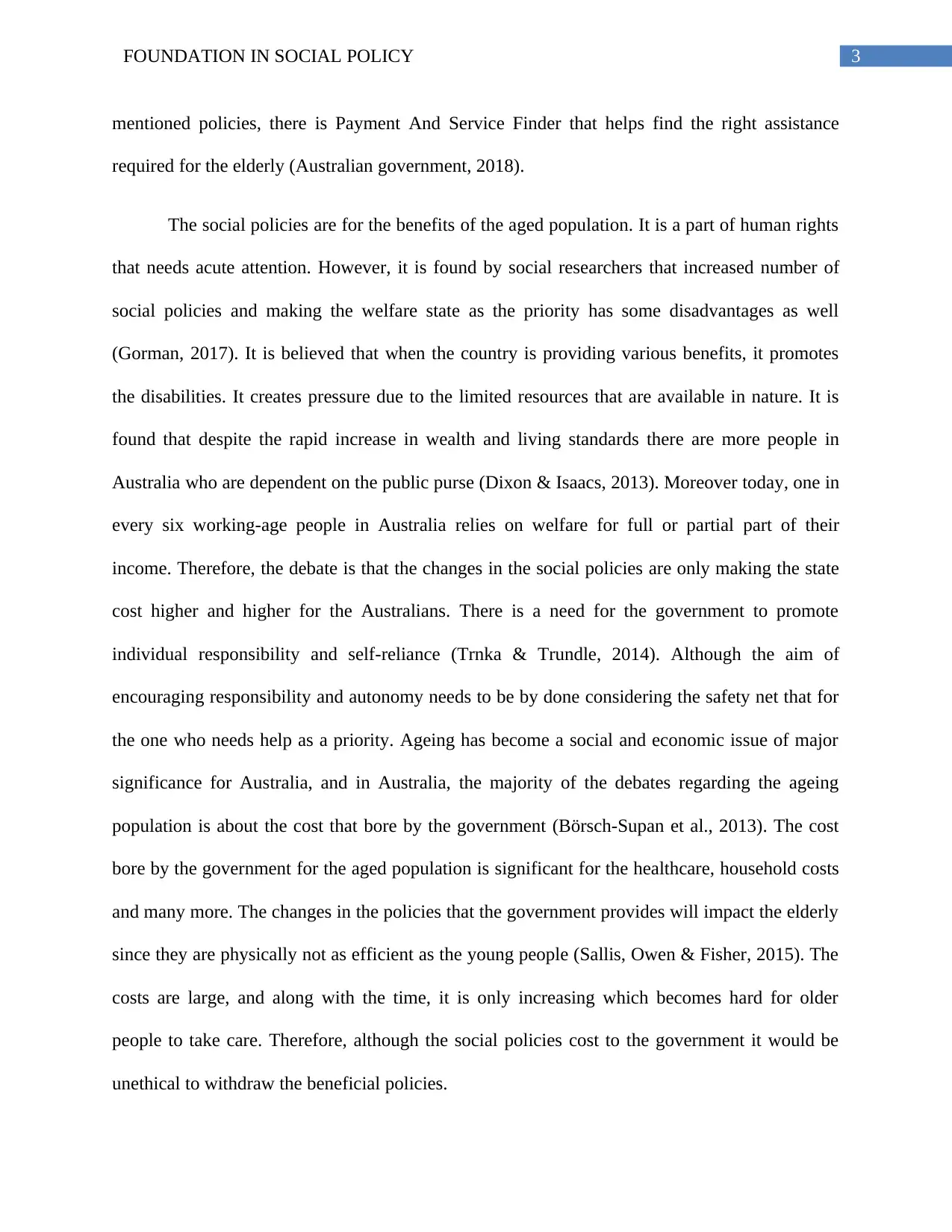
3FOUNDATION IN SOCIAL POLICY
mentioned policies, there is Payment And Service Finder that helps find the right assistance
required for the elderly (Australian government, 2018).
The social policies are for the benefits of the aged population. It is a part of human rights
that needs acute attention. However, it is found by social researchers that increased number of
social policies and making the welfare state as the priority has some disadvantages as well
(Gorman, 2017). It is believed that when the country is providing various benefits, it promotes
the disabilities. It creates pressure due to the limited resources that are available in nature. It is
found that despite the rapid increase in wealth and living standards there are more people in
Australia who are dependent on the public purse (Dixon & Isaacs, 2013). Moreover today, one in
every six working-age people in Australia relies on welfare for full or partial part of their
income. Therefore, the debate is that the changes in the social policies are only making the state
cost higher and higher for the Australians. There is a need for the government to promote
individual responsibility and self-reliance (Trnka & Trundle, 2014). Although the aim of
encouraging responsibility and autonomy needs to be by done considering the safety net that for
the one who needs help as a priority. Ageing has become a social and economic issue of major
significance for Australia, and in Australia, the majority of the debates regarding the ageing
population is about the cost that bore by the government (Börsch-Supan et al., 2013). The cost
bore by the government for the aged population is significant for the healthcare, household costs
and many more. The changes in the policies that the government provides will impact the elderly
since they are physically not as efficient as the young people (Sallis, Owen & Fisher, 2015). The
costs are large, and along with the time, it is only increasing which becomes hard for older
people to take care. Therefore, although the social policies cost to the government it would be
unethical to withdraw the beneficial policies.
mentioned policies, there is Payment And Service Finder that helps find the right assistance
required for the elderly (Australian government, 2018).
The social policies are for the benefits of the aged population. It is a part of human rights
that needs acute attention. However, it is found by social researchers that increased number of
social policies and making the welfare state as the priority has some disadvantages as well
(Gorman, 2017). It is believed that when the country is providing various benefits, it promotes
the disabilities. It creates pressure due to the limited resources that are available in nature. It is
found that despite the rapid increase in wealth and living standards there are more people in
Australia who are dependent on the public purse (Dixon & Isaacs, 2013). Moreover today, one in
every six working-age people in Australia relies on welfare for full or partial part of their
income. Therefore, the debate is that the changes in the social policies are only making the state
cost higher and higher for the Australians. There is a need for the government to promote
individual responsibility and self-reliance (Trnka & Trundle, 2014). Although the aim of
encouraging responsibility and autonomy needs to be by done considering the safety net that for
the one who needs help as a priority. Ageing has become a social and economic issue of major
significance for Australia, and in Australia, the majority of the debates regarding the ageing
population is about the cost that bore by the government (Börsch-Supan et al., 2013). The cost
bore by the government for the aged population is significant for the healthcare, household costs
and many more. The changes in the policies that the government provides will impact the elderly
since they are physically not as efficient as the young people (Sallis, Owen & Fisher, 2015). The
costs are large, and along with the time, it is only increasing which becomes hard for older
people to take care. Therefore, although the social policies cost to the government it would be
unethical to withdraw the beneficial policies.
Paraphrase This Document
Need a fresh take? Get an instant paraphrase of this document with our AI Paraphraser
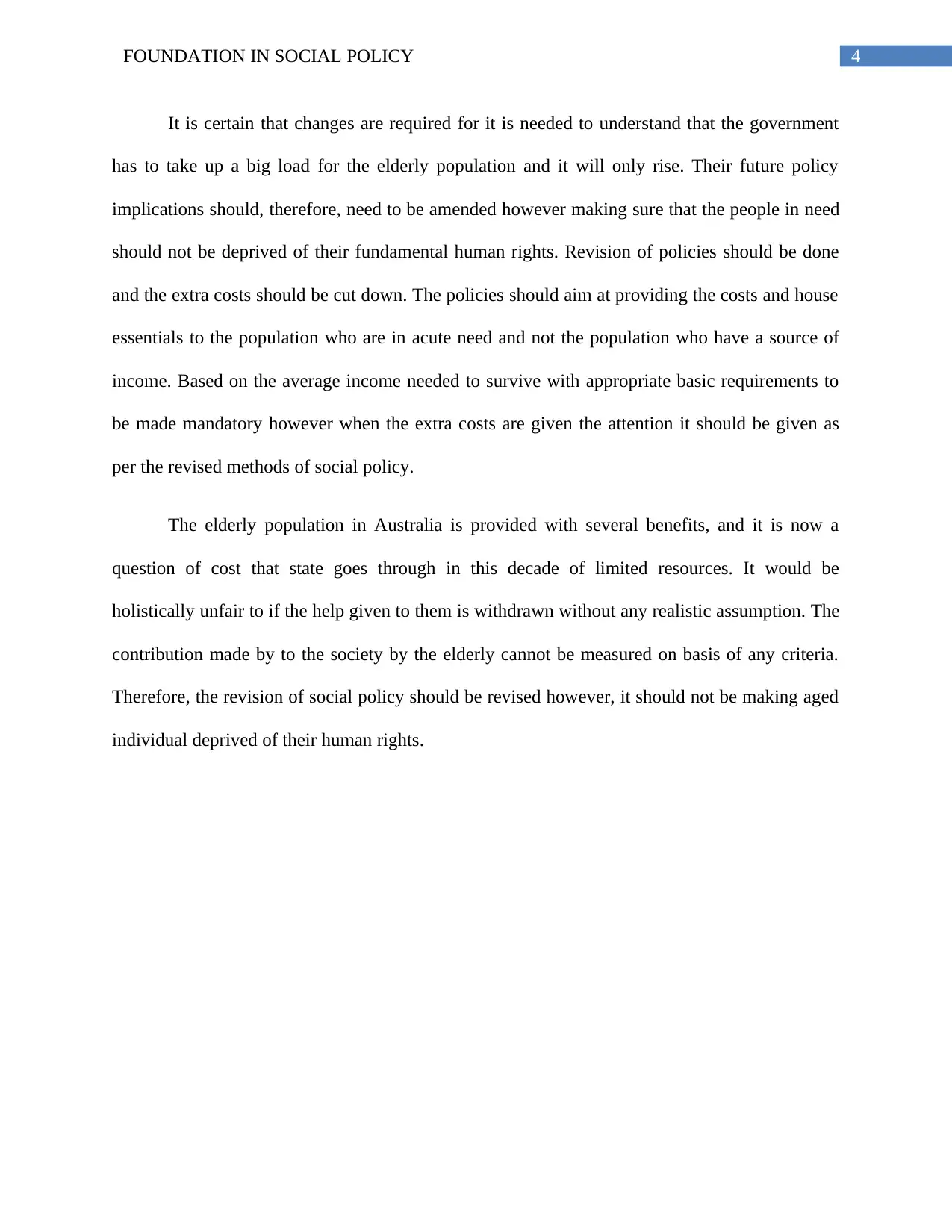
4FOUNDATION IN SOCIAL POLICY
It is certain that changes are required for it is needed to understand that the government
has to take up a big load for the elderly population and it will only rise. Their future policy
implications should, therefore, need to be amended however making sure that the people in need
should not be deprived of their fundamental human rights. Revision of policies should be done
and the extra costs should be cut down. The policies should aim at providing the costs and house
essentials to the population who are in acute need and not the population who have a source of
income. Based on the average income needed to survive with appropriate basic requirements to
be made mandatory however when the extra costs are given the attention it should be given as
per the revised methods of social policy.
The elderly population in Australia is provided with several benefits, and it is now a
question of cost that state goes through in this decade of limited resources. It would be
holistically unfair to if the help given to them is withdrawn without any realistic assumption. The
contribution made by to the society by the elderly cannot be measured on basis of any criteria.
Therefore, the revision of social policy should be revised however, it should not be making aged
individual deprived of their human rights.
It is certain that changes are required for it is needed to understand that the government
has to take up a big load for the elderly population and it will only rise. Their future policy
implications should, therefore, need to be amended however making sure that the people in need
should not be deprived of their fundamental human rights. Revision of policies should be done
and the extra costs should be cut down. The policies should aim at providing the costs and house
essentials to the population who are in acute need and not the population who have a source of
income. Based on the average income needed to survive with appropriate basic requirements to
be made mandatory however when the extra costs are given the attention it should be given as
per the revised methods of social policy.
The elderly population in Australia is provided with several benefits, and it is now a
question of cost that state goes through in this decade of limited resources. It would be
holistically unfair to if the help given to them is withdrawn without any realistic assumption. The
contribution made by to the society by the elderly cannot be measured on basis of any criteria.
Therefore, the revision of social policy should be revised however, it should not be making aged
individual deprived of their human rights.
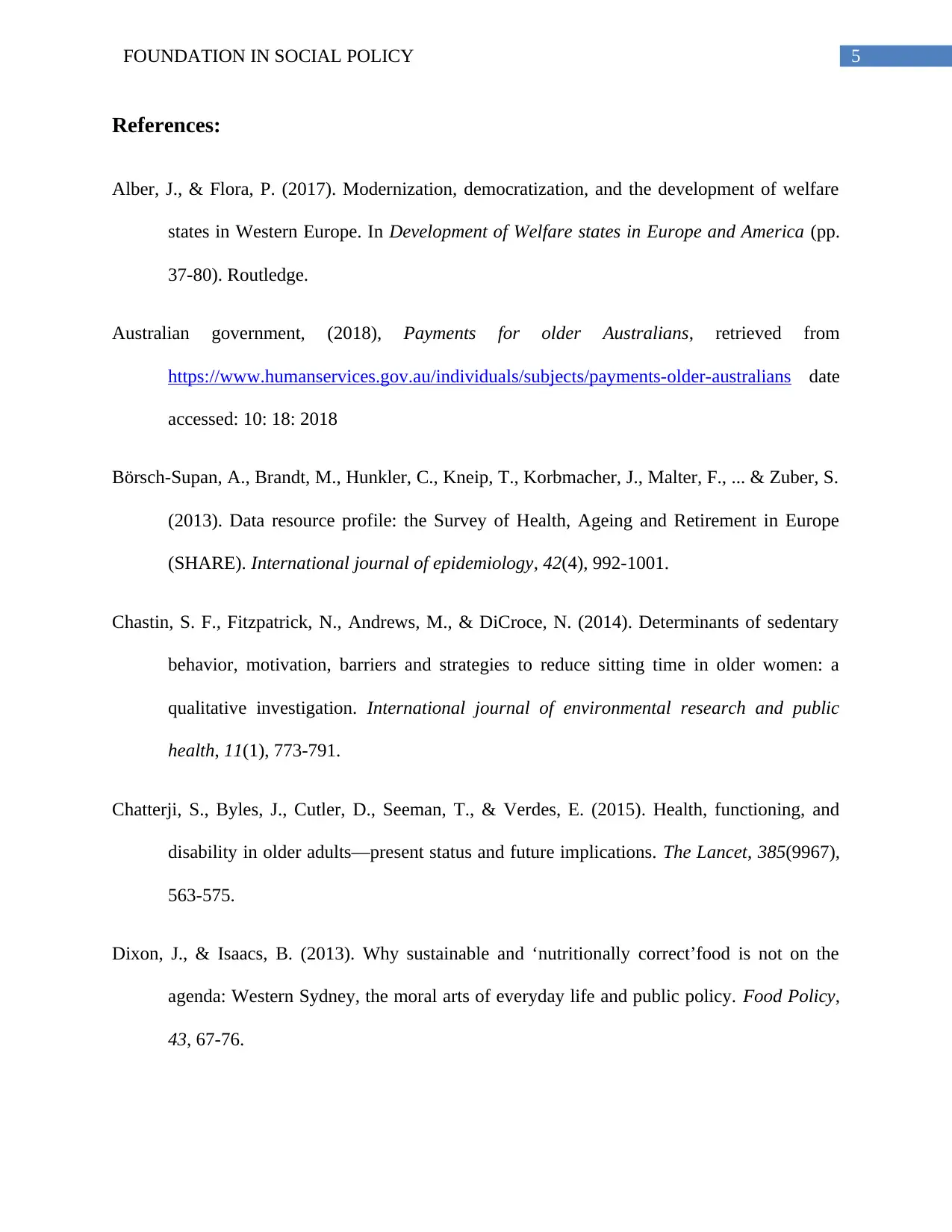
5FOUNDATION IN SOCIAL POLICY
References:
Alber, J., & Flora, P. (2017). Modernization, democratization, and the development of welfare
states in Western Europe. In Development of Welfare states in Europe and America (pp.
37-80). Routledge.
Australian government, (2018), Payments for older Australians, retrieved from
https://www.humanservices.gov.au/individuals/subjects/payments-older-australians date
accessed: 10: 18: 2018
Börsch-Supan, A., Brandt, M., Hunkler, C., Kneip, T., Korbmacher, J., Malter, F., ... & Zuber, S.
(2013). Data resource profile: the Survey of Health, Ageing and Retirement in Europe
(SHARE). International journal of epidemiology, 42(4), 992-1001.
Chastin, S. F., Fitzpatrick, N., Andrews, M., & DiCroce, N. (2014). Determinants of sedentary
behavior, motivation, barriers and strategies to reduce sitting time in older women: a
qualitative investigation. International journal of environmental research and public
health, 11(1), 773-791.
Chatterji, S., Byles, J., Cutler, D., Seeman, T., & Verdes, E. (2015). Health, functioning, and
disability in older adults—present status and future implications. The Lancet, 385(9967),
563-575.
Dixon, J., & Isaacs, B. (2013). Why sustainable and ‘nutritionally correct’food is not on the
agenda: Western Sydney, the moral arts of everyday life and public policy. Food Policy,
43, 67-76.
References:
Alber, J., & Flora, P. (2017). Modernization, democratization, and the development of welfare
states in Western Europe. In Development of Welfare states in Europe and America (pp.
37-80). Routledge.
Australian government, (2018), Payments for older Australians, retrieved from
https://www.humanservices.gov.au/individuals/subjects/payments-older-australians date
accessed: 10: 18: 2018
Börsch-Supan, A., Brandt, M., Hunkler, C., Kneip, T., Korbmacher, J., Malter, F., ... & Zuber, S.
(2013). Data resource profile: the Survey of Health, Ageing and Retirement in Europe
(SHARE). International journal of epidemiology, 42(4), 992-1001.
Chastin, S. F., Fitzpatrick, N., Andrews, M., & DiCroce, N. (2014). Determinants of sedentary
behavior, motivation, barriers and strategies to reduce sitting time in older women: a
qualitative investigation. International journal of environmental research and public
health, 11(1), 773-791.
Chatterji, S., Byles, J., Cutler, D., Seeman, T., & Verdes, E. (2015). Health, functioning, and
disability in older adults—present status and future implications. The Lancet, 385(9967),
563-575.
Dixon, J., & Isaacs, B. (2013). Why sustainable and ‘nutritionally correct’food is not on the
agenda: Western Sydney, the moral arts of everyday life and public policy. Food Policy,
43, 67-76.
⊘ This is a preview!⊘
Do you want full access?
Subscribe today to unlock all pages.

Trusted by 1+ million students worldwide
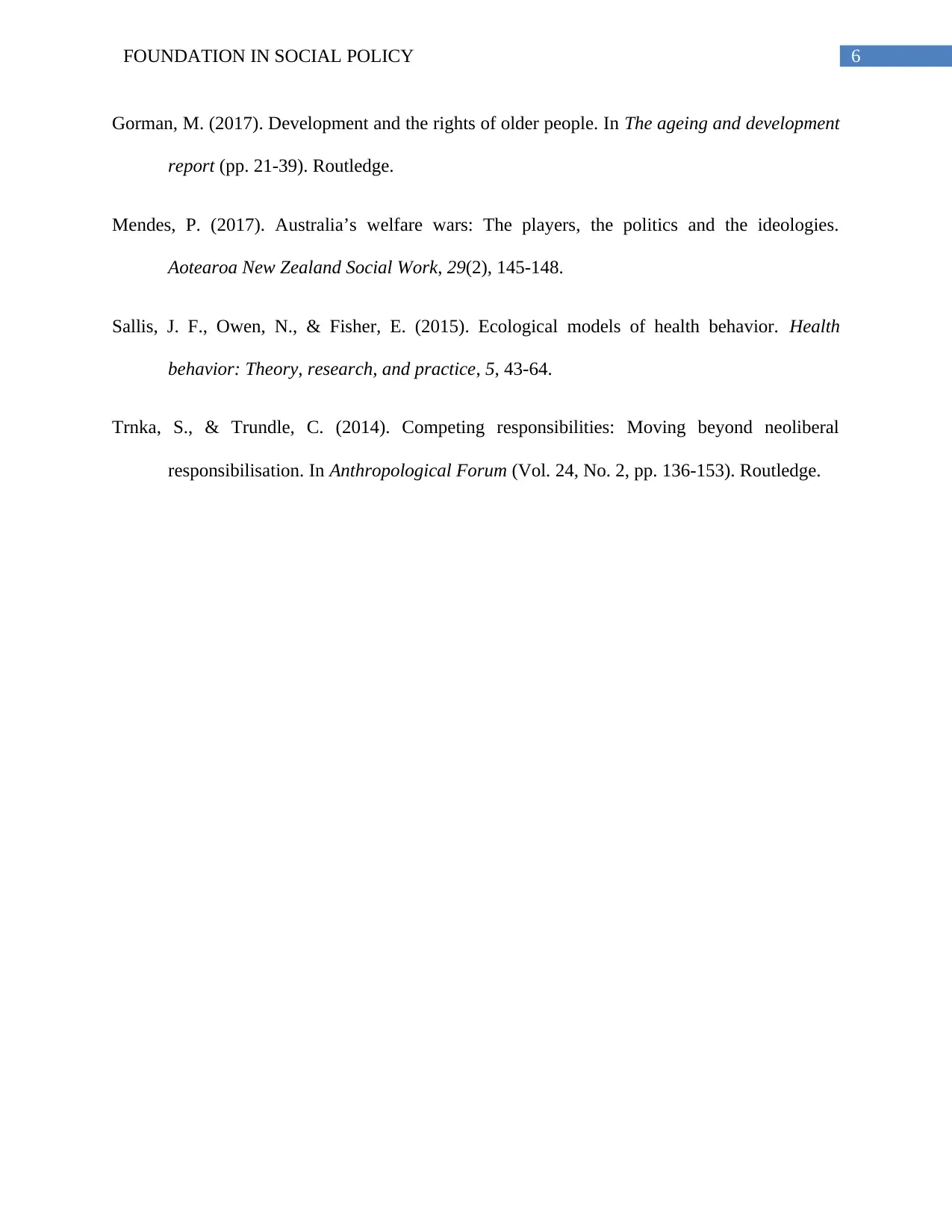
6FOUNDATION IN SOCIAL POLICY
Gorman, M. (2017). Development and the rights of older people. In The ageing and development
report (pp. 21-39). Routledge.
Mendes, P. (2017). Australia’s welfare wars: The players, the politics and the ideologies.
Aotearoa New Zealand Social Work, 29(2), 145-148.
Sallis, J. F., Owen, N., & Fisher, E. (2015). Ecological models of health behavior. Health
behavior: Theory, research, and practice, 5, 43-64.
Trnka, S., & Trundle, C. (2014). Competing responsibilities: Moving beyond neoliberal
responsibilisation. In Anthropological Forum (Vol. 24, No. 2, pp. 136-153). Routledge.
Gorman, M. (2017). Development and the rights of older people. In The ageing and development
report (pp. 21-39). Routledge.
Mendes, P. (2017). Australia’s welfare wars: The players, the politics and the ideologies.
Aotearoa New Zealand Social Work, 29(2), 145-148.
Sallis, J. F., Owen, N., & Fisher, E. (2015). Ecological models of health behavior. Health
behavior: Theory, research, and practice, 5, 43-64.
Trnka, S., & Trundle, C. (2014). Competing responsibilities: Moving beyond neoliberal
responsibilisation. In Anthropological Forum (Vol. 24, No. 2, pp. 136-153). Routledge.
1 out of 7
Related Documents
Your All-in-One AI-Powered Toolkit for Academic Success.
+13062052269
info@desklib.com
Available 24*7 on WhatsApp / Email
![[object Object]](/_next/static/media/star-bottom.7253800d.svg)
Unlock your academic potential
Copyright © 2020–2025 A2Z Services. All Rights Reserved. Developed and managed by ZUCOL.





